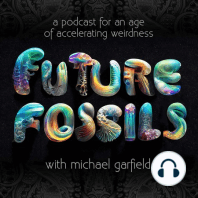66 min listen
34 - Tara Djokic (The Oldest Fossils Known To Science!)
FromFUTURE FOSSILS
ratings:
Length:
77 minutes
Released:
Jul 21, 2017
Format:
Podcast episode
Description
Subscribe to Future Fossils on iTunesSubscribe to Future Fossils on StitcherJoin the Future Fossils Facebook GroupSupport Future Fossils on Patreon This week we talk about what the oldest fossils in the world have to teach us about life’s origins and destiny with Tara Djokic of the University of New South Wales. Tara’s a geologist and astrobiologist whose team and work just appeared on the cover of Scientific American for changing our ideas about the beginning of our story… http://www.pangea.unsw.edu.au/people/students/tara-djokic https://www.nature.com/articles/ncomms15263 http://www.npr.org/sections/thetwo-way/2017/05/09/527575457/australian-fossils-hint-at-where-to-search-for-life-on-mars QUOTES: “Thinking for humanity, moving forward and prospering as a global community – a lot of people in power aren’t thinking that way.” “We can only base what we know about life, and about intelligent life, on what we know here on Earth, because we’ve got no other sample. And until that happens, we can only make hypotheses.” “I can only speak for me. And when I think, okay, well, we all just came from goo, and maybe one day the universe won’t be here anymore, I find that pretty humbling. And that’s pretty much the reason I got into this field. Relationships come and go, friendships come and go, life changes and evolves…and the society we live in is so distracting, and we get caught up in trivial things…when you put that all in perspective and think, we all just came from goo, it just makes you a little bit HUMBLER. Because I do get caught up in the same stuff that everybody else does. We’re humans; we’re governed by our emotions and our biology…if I can look outside of that biological box as a human being and put things in perspective, then I’m going to. And that’s what I think astrobiology does, and that’s what I think studying the origins of life does.” “We’re really just a macro-sized version of a microbial community on the planet.” “We’re a community. But unfortunately, for some reason, humans all seem to think we’re individual and the pocket over here can do whatever they want and it won’t affect the pocket over there.” “The one saving grace we have for humanity is hope. Hope is what drives anybody to do anything, right? The hope to achieve something. The hope that they’re going to succeed.” “The key difference between science and religion is that science gives you the information and then you can make your own decision, whereas a lot of the time it’s, ‘This is the information; take it or leave it.’ For me the beauty of science and the beauty of education is that you’re able to make critical decisions FOR YOURSELF.” TOPICS: - What are the oldest fossils on the planet? - What was the environment in which life emerged on Earth? - Explaining scientific research to strangers. - The relationship between scholarship and leisure. - How she become an astrobiologist - Fermi’s Paradox & The Great Silence (or, “If life is so likely, why don’t we hear anybody?”) - Have we not encountered intelligent extraterrestrials because they tend to wipe themselves out, or because they’ve learned to encrypt all of their communication to look like radio noise? - The two kinds of scientists: concepts first, then hypothesis; or data first, then hypothesis. - The mystical experience of doing paleontological fieldwork in the Badlands. - How does this research help us understand where to look for life elsewhere in the solar system? - What the study of ancient life reveals about overarching patterns in every part of the cosmos. - The Great Oxygenation Event 2.4 billion years ago and what we can learn from this ancient catastrophe. - The importance of good science writing in an age of “alternative facts.” - The difficulties faced by science in an age when so much of discovery is made with the assistance of sophisticated machines. MENTIONS: - Edgar Mitchell - Bruce Damer & Dave Deamer - Paolo Soleri - The Light of Other Days by Arthur C. Clarke & Stephen Baxter -
Released:
Jul 21, 2017
Format:
Podcast episode
Titles in the series (100)
25 - DADARA (Art, Virtual Realities, & Flow States): This week we're joined by Daniel Rozenberg aka DADARA for a thoughtful discussion about Art in Virtual Realities, Information Overload, and Flow States. The creator of Exchangibition Bank, Like4Real, and the upcoming Solipmission... by FUTURE FOSSILS
